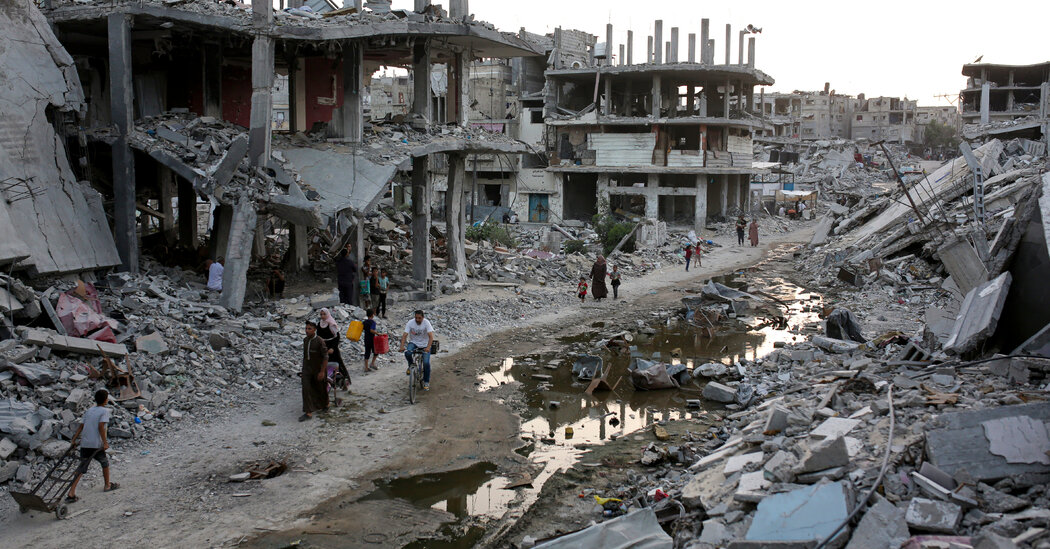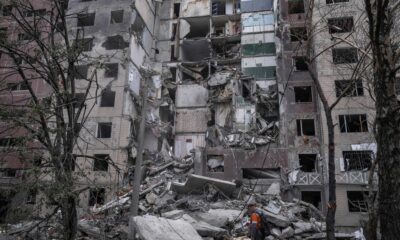Breaking News
Hamas’s Cease-Fire Proposal Includes a Familiar Sticking Point

Hamas has recently adjusted its position in the latest Gaza cease-fire proposal, but is still holding onto a crucial demand that has been a major obstacle to reaching a deal, according to two senior officials involved in the negotiations.
This development has reduced the likelihood of an immediate agreement, despite expressions of optimism from U.S. and Israeli officials now that the talks are progressing after weeks of deadlock.
Hamas submitted a counterproposal on Wednesday. The two officials revealed that Hamas is seeking international guarantees that, once an initial truce is implemented, both sides will continue negotiating until a final agreement is reached to end the conflict and release all remaining hostages in Gaza.
Essentially, Hamas wants to ensure that it does not hand over many hostages only for Israel to resume hostilities, one of the officials explained. Both senior officials spoke anonymously as they were not authorized to speak publicly.
Israeli negotiators promptly rejected this demand, according to the two officials. Israel insists on retaining the option to resume military action if deemed necessary. Without this leverage, Hamas could prolong the process, effectively achieving an unofficial permanent cease-fire, one official argued.
At the core of the disagreement lies the future of Gaza. Israeli Prime Minister Benjamin Netanyahu has vowed to dismantle Hamas and overthrow its governance in the Palestinian territory. Hamas is hoping that a lasting cease-fire will enable it to maintain its position of power.
Israeli military leaders now increasingly advocate for a deal that would bring back the remaining 120 hostages, even if it means leaving Hamas in control for the time being.
The negotiations are based on a three-stage framework initially introduced by President Biden in late May and subsequently endorsed by the United Nations Security Council.
Both parties agree on the general parameters of an agreement that includes a six-week cease-fire and the release of most civilian hostages in exchange for Palestinian prisoners.
During the interim period, Israel and Hamas would negotiate the next phase: ending the conflict and freeing the remaining living hostages, the majority of whom are soldiers.
The current debate revolves around what happens following these steps.
With a potential agreement in sight, C.I.A. Director William J. Burns is scheduled to travel to Doha in the upcoming week for discussions with intelligence officials from Israel, Europe, and other nations regarding the cease-fire deal, as per three informed sources.
Mr. Burns is also expected to visit Israel to maintain pressure on the Israeli government to accept the deal.
U.S. officials believe that the recent revisions to the agreement, outlining specific conditions for transitioning between phases, could pave the way for the release of hostages who have been held captive for months.
However, even if Israeli negotiators manage to secure a deal to end the conflict in Gaza, it remains uncertain whether Mr. Netanyahu’s government will support it. Two prominent members of his coalition have dismissed the idea of a complete cease-fire, and Mr. Netanyahu himself has publicly vacillated on endorsing the framework.
Approximately 120 hostages are still held in Gaza out of around 250 individuals abducted in the Hamas-led incursion, according to Israeli authorities. About one-third of them are believed to be deceased by Israeli officials.
During a weeklong truce in November, 105 hostages were released in exchange for 240 Palestinian prisoners. However, Hamas has refused to release any more hostages without a clear path to a lasting cease-fire.
On Friday, an Israeli delegation led by David Barnea, head of the Mossad intelligence agency, arrived in Qatar for the first time in weeks for further discussions. Mr. Barnea met with Qatari Prime Minister Mohammed bin Abdulrahman bin Jassim Al Thani, a key mediator.
In a unique arrangement, Mr. Barnea did not travel with other senior Israeli security officials involved in the negotiations. Instead, he was accompanied by Ophir Falk, a close aide to Mr. Netanyahu, as per the two senior officials.
Both the Israeli military and Shin Bet intelligence service, which are part of the negotiations, declined to provide comments.
Hamas did make a significant concession in its counterproposal by easing its stance on the negotiation terms for the second phase of the cease-fire. Initially, the group wanted these discussions to focus solely on the release of Palestinian prisoners in exchange for hostages.
This concession came after weeks of pressure on Hamas by Qatar, where much of the armed group’s political leadership is based in Doha, the officials disclosed.
However, at the same time, Hamas is seeking assurances from mediating countries, including the United States, that the negotiations during the truce will persist until a lasting cease-fire is established and all living hostages are freed, as per the two officials.
Israeli negotiators had previously agreed that the six-week truce could be extended if the negotiations were making progress. Hamas’s revised language could be interpreted as allowing these talks — and the initial truce — to continue indefinitely, one senior official noted.
During the discussions in Qatar, Mr. Barnea argued that Hamas’s demand would fundamentally deviate from the proposal endorsed by the U.N. Security Council and by President Biden, the senior official mentioned.
As the cease-fire talks advanced, Israel’s military operations in Gaza persisted on Saturday throughout the region. Israeli airstrikes targeted an area near a United Nations school in Nuseirat in central Gaza, where the Israeli military alleged that Palestinian militants were active. At least 16 individuals were killed and dozens injured in the attack, according to the Gaza health ministry, which does not differentiate between civilians and combatants.
The school had become a refuge for displaced individuals seeking safety, the ministry added. The Israeli military stated that it attempted to minimize civilian casualties and attributed blame to Hamas for operating in densely populated areas with Gazan civilians.
-

 Destination9 months ago
Destination9 months agoSingapore Airlines CEO set to join board of Air India, BA News, BA
-

 Breaking News10 months ago
Breaking News10 months agoCroatia to reintroduce compulsory military draft as regional tensions soar
-

 Gadgets4 months ago
Gadgets4 months agoSupernatural Season 16 Revival News, Cast, Plot and Release Date
-

 Tech News1 year ago
Tech News1 year agoBangladeshi police agents accused of selling citizens’ personal information on Telegram
-

 Productivity12 months ago
Productivity12 months agoHow Your Contact Center Can Become A Customer Engagement Center
-

 Gadgets1 month ago
Gadgets1 month agoFallout Season 2 Potential Release Date, Cast, Plot and News
-

 Breaking News10 months ago
Breaking News10 months agoBangladesh crisis: Refaat Ahmed sworn in as Bangladesh’s new chief justice
-

 Toys12 months ago
Toys12 months ago15 of the Best Trike & Tricycles Mums Recommend























